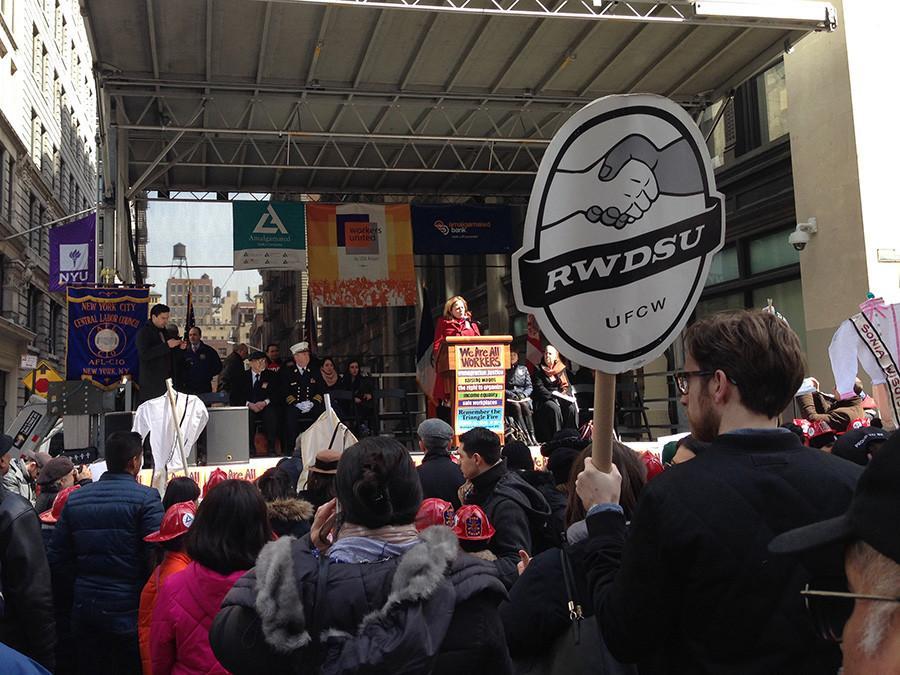Activists remember Triangle Shirtwaist Factory fire
Groups of protesters rally at the 104th anniversary of the Triangle Shirtwaist Factory Fire, in which 146 people died.
March 25, 2015
Students, activists and community leaders rallied together to fight for labor workers’ rights in commemoration of the 104th anniversary of the Triangle Shirtwaist Factory fire on Wednesday. People congregated around a stage on the corner of Washington Place and Greene Street to show support for the workers’ rights movement.
Members of city council, labor union groups and students labor groups from around the world spoke in front of the Silver Center for Arts and Science, the site of the Triangle Shirtwaist Factory Fire.
Vincent Alvarez, president of NYC Central Labor Council, took a moment to remember those who lost their lives in the Triangle Shirtwaist Factory 104 years ago.
“It is very important to make sure that we are remembering the people who’ve died, because we still unfortunately today, not only here in our country but throughout the world, have too many people being hurt at work,” Alvarez said.
In April 2013, a similar catastrophe occurred in Bangladesh where the collapse of Rana Plaza killed over 1,000 textiles workers. This example served as a tragic reminder that labor rights violations are still a pressing issue in the modern world.
Morgan Courrier, a national organizer with United Students Against Sweatshops, said her main focus in labor rights is The Children’s Place’s involvement in the collapse of Rana Plaza.
“Right now we’re here today because our big campaign is against The Children’s Place and all of the brands that are producing in Bangladesh but refusing to agree to fire safety regulations in their factories,” Courrier said. “We have a lot of leverage in the United States. We as students and as community members are able to make these demands about the companies here, and history shows that they will respond.”
Gallatin junior Robert Asherman compared NYU’s alleged labor violations in Abu Dhabi to The Children’s Place’s alleged labor violations in Bangladesh.
“NYU is basically using the exact same system of labor exploitation as The Children’s Place,” Asherman said. “They say, ‘We’re not responsible because this factory was subcontracted. It is the factory owner’s fault.’ And with NYU’s campus in Abu Dhabi they’re saying, ‘We’re not responsible. We treat the workers the best that we can, but it’s the subcontractors.’”
University spokesperson John Beckman said the parallel Asherman drew between NYU and The Children’s Place was misguided and incorrect.
“This is a poor and tendentious attempt at an analogy,” Beckman said. “The fact is that NYU and its Abu Dhabi partners established an unprecedented set of standards for workers on the NYUAD project, a set of standards even HRW praised. Allegations have been raised about whether those standards were fully met, and that is being reviewed by an independent investigator whose report will be made public.”
Jim Slevin, president of the Utility Workers of America Local 1, said the major takeaway from this rally is the importance of education. He said the public needs to be more aware of working conditions, and studying what went wrong at the Triangle Shirtwaist Factory can help in understanding the current issues.
“There’s not a job big enough for people to take an employment and say, ‘I came to work today to die.’ People come to work to make a living.” Slevin said. “I think employers are taking shortcuts and risking them, and not just the worker but families and communities.”
Additional Reporting by Felipe de la Hoz. A version of this article appeared in the Thursday, March 26 print edition. Email Alanna Bayarin at [email protected].
























































































































































